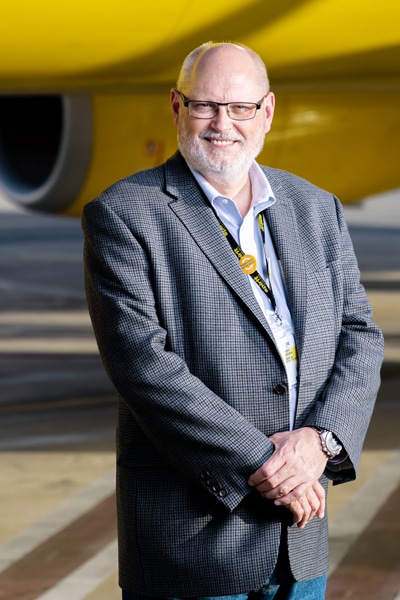|
Getting your Trinity Audio player ready... |
When Rocky Wiggins joined Spirit Airlines in 2016, the company was preparing for an era of rapid growth, so he quickly got to work on several initiatives, both short-term and long-term.
“Every year, we have a long list of capital IT projects that the business requests, which is not unusual at all, especially in a growing airline,” says Wiggins, Spirit’s senior vice president and chief information officer. “As you grow, you need bigger and better systems, so you need to automate things you might not have needed to when you were smaller.”
While he and his team were always ready for unexpected challenges, things pretty much went according to plan. Spirit Airlines grew, and Wiggins took on the hard work required to encourage that growth.
And then came COVID-19.
“There’s a lot of inherent demand associated with the growth of the airline, so we entered 2020 with a whole lot of stuff on our plate that we wanted to be doing. When COVID hit, the demand just disappeared,” Wiggins notes in his October 2020 interview. “What we had to do is take a hard look at the cash flow. We had to take a hard look at the money we were about to spend on some of these projects and say, ‘Does it still make sense for us to spend it that way? Which projects should we continue to do? Which projects should we put on hold and save our cash, and which projects that we hadn’t thought about should we do?’ COVID really made us rethink everything in a hurry.”

If anyone was prepared for this challenging era, it’s Wiggins. He originally wanted to be an electrical engineer, but he quickly developed an interest in computers and technology. Working in aviation was a natural step for him as his family worked in the industry in Kentucky, where he grew up. Wiggins even worked at the local airport while in high school and college. “I had aviation in my blood, or jet fuel in my blood, as they say,” he jokes.
He started his career at Air Kentucky Airlines, when technology was starting to make its impact in the travel industry. He then worked for Allegheny Airlines in Pittsburgh, which soon became US Airways, and was involved in artificial intelligence and operations research to help determine demand patterns, how many seats to sell at various prices, etc.
It was while working at US Airways that he developed his interest in and passion for building decision-support systems. “I kind of migrated from the business to the technology side and immersed myself in the building of systems that would be used for this kind of work,” Wiggins remembers.
He eventually took the position of senior director of decision-support systems for US Airways, then held roles at Sabre Airline Solutions in Dallas, AirTran Airways in Atlanta, Sun Country Airlines in Minneapolis, and WestJet in Calgary, Canada, before joining Spirit in Miami.
Though the pandemic has put a halt to many initiatives across the country, Wiggins and his team have been able to continue with projects that were in motion leading into 2020. One such project is the launch of the redesigned loyalty program. “From an IT perspective, the real roll-your-sleeves-up coding work—the real engineering work of it all—was planned to kick off at the beginning of this year,” Wiggins says. “We had just started that when COVID hit.”
Another initiative is touchless technology, which he explains is not just a temporary trend but something that has become more prominent due to the pandemic. “When guests started to come back and start flying again, we needed to be ready to give them as close to a touchless experience as we could,” he points out.
This includes promoting the airline’s home check-in process, which allows travelers to list the number of checked bags. At the airport, a kiosk provides tags that customers apply themselves for agents to scan. That process, along with using the mobile app, cuts down on paper. “When you come to the airport and walk through that door, we want you to be ready to get on the plane,” Wiggins says.
“When guests started to come back and start flying again, we needed to be ready to give them as close to a touchless experience as we could.”
Another new technology combines kiosks and a bag-scanning device that lets customers know if their bags are the proper weight and size. It’s a customer-friendly program that has been introduced at New York’s LaGuardia Airport, Las Vegas’ McCarran International Airport, and Chicago O’Hare International Airport.
Spirit’s touchless strategy also includes a prototype through which customers can identify themselves by sliding a driver’s license into a scanner that uses biometrics to confirm the traveler’s identity. It’s an innovation the airline has been working on with the TSA.
“Not only have we exceeded that target, we greatly exceeded it,” Wiggins confirms. “We’re doing it very successfully, and we’ll be rolling that out into the future. We’re the first carrier to do this, and we’re really excited about that. The TSA has been super supportive, and we hope to see that rollout through the industry as more and more people see what we’re doing.”
And with the innovations Wiggins and his team are making, lots of people are sure to notice how Spirit continues to grow.
Publicis Sapient helps unlock value through a start-up mindset and modern methods, fusing strategy, consulting and customer experience with agile engineering and problem-solving creativity. As digital pioneers, our experience spanning technology, data sciences, consulting and customer obsession enables us to accelerate our clients’ businesses through designing the products and services their customers truly value.

